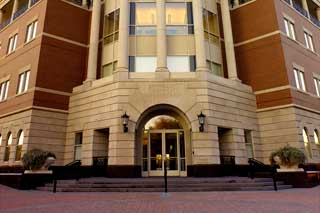About MCC

Founded in 1963, the Michigan Catholic Conference serves as the official voice of the Catholic Church in Michigan on matters of public policy. In addition, the Michigan Catholic Conference develops, coordinates, and manages programs that provide retirement benefits, health, dental, disability, and life insurance coverage for lay employees and clergy, as well as property and casualty coverage for the Church throughout Michigan.
Statement of Mission
In communion with the Catholic Church and in accordance with Her teachings, Michigan Catholic Conference promotes a social order that respects human life and dignity and serves the common good through public policy advocacy and the administration of benefit and risk management services.
Board of Directors
The Michigan Catholic Conference Board of Directors is comprised of the seven diocesan bishops plus five lay persons, one priest, and one religious sister. The Archbishop of Detroit is the Chairman of the Board. The following is a complete list of current members of the Board:
Most Reverend Edward J. Weisenburger
Archbishop of Detroit
Chairman
Most Reverend Earl A. Boyea
Bishop of Lansing
Vice-Chairman
Mr. Mark Murray
Grand Rapids
Secretary/Treasurer
Sr. Mary Rafqa Boulos, RSM
DeWitt
Most Reverend John F. Doerfler
Bishop of Marquette
Reverend John D. Fleckenstein, Jr.
St. Joseph
Most Reverend Robert D. Gruss
Bishop of Saginaw
Ms. Anne Kennedy
Bloomfield Hills
Most Reverend Edward M. Lohse
Bishop of Kalamazoo
Dr. Theresa Marshall
Ann Arbor
The Honorable Michael J. Talbot
Plymouth
Most Reverend David J. Walkowiak
Bishop of Grand Rapids
Most Reverend Jeffrey J. Walsh
Bishop of Gaylord
Mr. Bill Wesley
Ada
History
The Michigan Catholic Conference was established by His Eminence John Cardinal Dearden, then Archbishop of Detroit, who in the early 1960’s envisioned a unified Catholic voice that would bring its economic and social justice message to the executive, legislative and judicial branches of state and federal government. At the time society was going through a fantastic transformation and needed an informed position on matters such as civil rights for minorities, proper treatment and training of migrant workers and human sexuality issues.
After thorough planning and extensive research and consultation with Michigan’s diocesan bishops, including Bishop Babcock of Grand Rapids, Bishop Albers of Lansing, Bishop Woznicki of Saginaw and Bishop Noa of Marquette, Cardinal Dearden’s insight led to the creation in 1963 of the Michigan Catholic Conference—the public policy voice of the Catholic Church in Michigan.
Mr. Francis J. Coomes, who came to the Conference as executive director of Catholic Charities of Michigan, was entrusted with the responsibility of developing the mission of the Conference in accordance with the vision of the founding bishops. Serving the Conference as executive director until his resignation in 1971, Mr. Coomes was succeeded by Mr. Thomas M. Bergeson, Monsignor Herman H. Zerfas, Sister Monica Kostielney, R.S.M., and currently Mr. Paul A. Long.
Governed by a 14-member board of directors that includes the diocesan bishops of the province of Detroit, five lay members, one priest, one religious sister and the archbishop of Detroit as chairman of the board—the Michigan Catholic Conference immediately began compiling an impressive list of accomplishments after its incorporation. Known early for its proactive course of action, the Conference issued a statement promoting civil rights prior to the signing of the Civil Rights Act of 1964.
Throughout the decade and those that followed, the Conference was instrumental in such initiatives as providing auxiliary services to non-public school students, creating migrant training and welfare centers in Michigan, launching a successful ballot proposal to exempt food and drugs from sales tax and, most notable, the Conference’s efforts in the early 70’s in support of a public campaign against “abortion on demand.”
Leading into the 1980’s the Conference worked diligently toward ending Medicaid funding of abortion, produced a statement on the Church’s position against the death penalty, called for Catholic voters to seek candidates’ positions on important issues during election season, discussed the AIDS epidemic, and advocated for teen health and school based clinics.
The Conference’s activity continued into the 1990’s by working to enact parental consent laws regarding abortion, developed a moral statement that addressed the state’s social service budget, called for educational reform in the state and confronted critical human life issues such as euthanasia and human cloning. The Church’s advocacy against euthanasia culminated with the Conference’s efforts in 1998 to defeat a ballot proposal that sought to legalize assisted suicide.
New challenges emerged in the first decade of the 21st Century that witnessed significant public advocacy on the part of the Conference. In that ten year span school vouchers, affirmative action, human embryo research and the traditional definition of marriage were all decided through referendum at the statewide ballot. The Conference also spoke to a proposed constitutional convention, protected necessary social service programs during the recession years, continued to advocate for school choice on behalf of parents and students, and welcomed the creation of an Earned Income Tax Credit.
As we move into the second decade of the 21st Century, unprecedented threats to religious liberty and freedom of conscience have regrettably emerged at both the federal and state levels that will necessitate the powerful voice of the Conference as well as the faithful through grassroots advocacy. While a strong focus will remain on these matters, Michigan Catholic Conference will continue to work for the common good by advocating for human life, economic and social justice, religious freedom, education and the traditional family structure—all in the spirit of the Beatitudes and in accord with the teachings of the Catholic Church.
